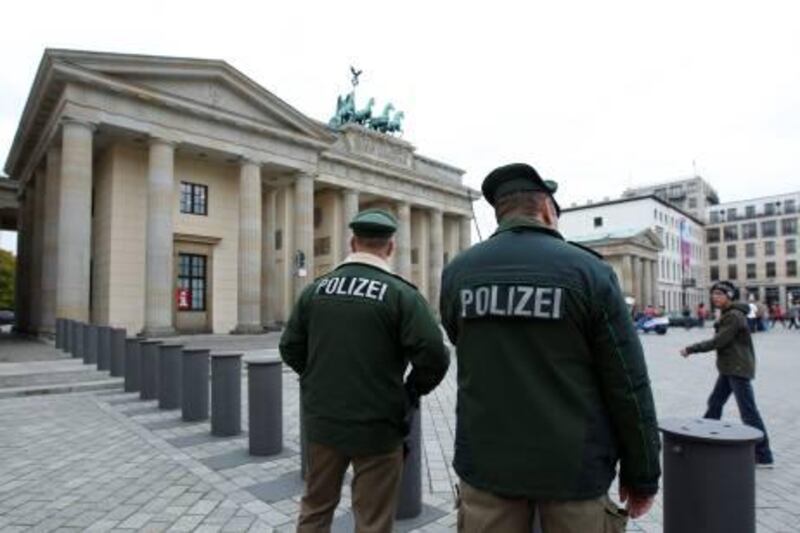Berlin // The killing of up to eight German Islamist militants in a remote corner of Pakistan has sparked fresh concern about home-grown terrorism in Europe.
A drone controlled by the Central Intelligence Agency fired two missiles into a house in Mir Ali, a town in North Waziristan identified as a militant base.
Pakistani intelligence sources were reported to have said the militants, including the eight German men, might have been members of a terrorist cell from the port city of Hamburg who had travelled to the region to obtain training for attacks back home.
Reports said those killed in Monday's attacks were Germans of Turkish descent, but the German government said it could not confirm their identity. It has also declined to comment on speculation the strike was aimed at preventing an impending attack in Europe. But fears of a possible strike spurred the United States and other western nations to issue warnings to their citizens.
German authorities have been trying to allay fears of domestic commando-style attacks after US and British media cited intelligence sources as saying Berlin's Adlon Hotel, its main railway station and the landmark television tower were among possible targets.
"There is at present no need for alarm," said the interior minister, Thomas de Maizière. "There are currently no concrete indications of imminent attacks in Germany. However, there is a high level of abstract threat, with German interests at home and abroad having been a target of international terrorism for some time. We take all indications very seriously and investigate them very carefully."
According to German media reports, Ahmad Sidiqi, an Afghan-born German militant captured this summer, told US interrogators in Afghanistan that Islamist terrorists planned attacks in Europe.
US officials seem to be taking Mr Sidiqi's statements more seriously than German authorities. Officials in Berlin doubt how much Mr Sidiqi, 36, really knows and suspect that US authorities and media may be playing up the terrorist threat to score political points before congressional elections next month, one unnamed Berlin government official told Suddeutsche Zeitung, a German newspaper.
Mr de Maizière said the threat was not new and that there had been indications since spring 2009 that al Qa'eda had long-term plans to carry out attacks in the US and in Europe, including Germany.
"For weeks, our federal security authorities have been working very closely with our international partners. The same applies to me personally. We are drawing on all available sources of information," Mr de Maizière said. However, the terrorist alerts and the drone strike have thrown a spotlight on young Muslims who have grown up in Germany and become radicalised. German intelligence agencies say scores of young men, possibly more than 100, have travelled to terrorist camps in the tribal border areas of Pakistan, and that many are now back in Germany. They are regarded as a significant threat because of their training, knowledge of European society and ability to travel unhindered with legal German passports.
The Federal Criminal Police Office estimates that 400 radical Islamists live in Germany, of whom 130 are regarded as dangerous and 70 may have been to terrorist camps.
The head of Germany's police union, Konrad Freiberg, said there were 40 militants in Germany who had received bomb-making training abroad.
"An increasing number of people have travelled from Germany to the training camps there - and many of them returned and are now living here," Mr Freiberg told Passauer Neue Presse," a German newspaper. "We have to expect attacks."
He said the police did not have the means to keep them under surveillance around the clock.
The German public first became aware of the dangers posed by Islamist extremists on its soil in 2001 when it emerged that some of the suicide bombers, including Mohammed Atta, had used Hamburg as a base for planning the 9/11 suicide attacks on the US. In August, authorities shut down the Hamburg mosque where Atta had prayed because it had remained a focal point for radical Islamists. Last year, a group of 10 suspected jihadists who worshipped there travelled to Pakistan, apparently for terrorist training.
So far, Germany has been spared a major terrorist attack thanks to a combination of luck and solid police work, in some cases aided by US authorities. In 2007, German security services foiled a plan by Islamist militants for bomb attacks against US installations in Germany.
The militants, two German nationals and one Turk, are believed to have trained in Pakistan militant camps. About four million Muslims, most of them of Turkish origin, live in Germany. Dozens have become militants not just because of Germany's involvement in Afghanistan, where it has the third-largest foreign military contingent, but also due to anger and a sense of alienation at mounting Islamophobia, security analysts say.
Divisions in German society have been highlighted recently by the success of an inflammatory book written by a senior official from the German central bank, Thilo Sarrazin, who said the country was in decline because of a growing underclass of poorly educated Muslim immigrants. He agreed to resign after calls for his sacking.
In a further sign of tensions, the German president, Christian Wulff, has been criticised for saying in a speech on Sunday, "Islam is part of Germany." A survey published yesterday in the daily Bild showed 66 per cent of Germans disagreed with him.






